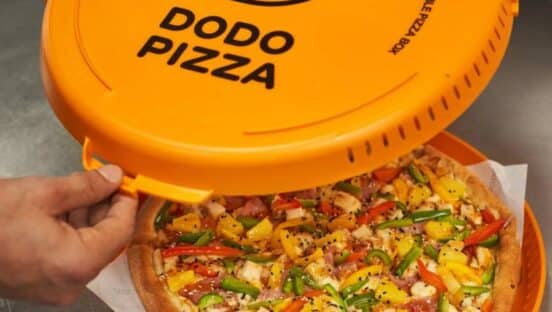In the last 60 years, the disposable cardboard box has become a pillar of the pizza segment. Domino’s alone can deliver up to 1.5 million pizzas every day. It begs the question of how much waste these boxes create each year, piling up inside residential garbage cans and college campus dumpsters.
Dodo Pizza wants to reimagine the way guests consume the staple dish. The franchise chain operates in 17 countries, recently launching reusable pizza boxes for delivery in Dubai. It is the first food and beverage company to offer this option in the Middle East, and the first worldwide to make it free of charge for customers. The concept is known for its digital-first approach and new sustainability initiatives.
Dodo Pizza falls under the Dodo Brands umbrella, a collection of foodservice concepts that are tech-powered and poised to franchise globally. These digital-first brands include Dodo Pizza, Doner 42 kebabs, and Drinkit coffee.
Despite its technology-first model, Dodo Pizza has opted out of working with third-party delivery aggregators. Instead, the company prefers direct contact with customers. Its dine-in areas are well-adjusted to local markets, and its take on pizza delivery has put a larger focus on sustainability than most brands.
“We dreamed about launching reusable packaging [for our pizza] and thought that Dubai would be a great place to test it since it is a very innovative and flexible market,” says Dodo Brands founder Fyodor Ovchinnikov. “Customers in Dubai are also quite concerned about the environment.”
To execute this dream, Ovchinnikov teamed up with PIZZycle, a German startup that created a minimalistic container that can be reused up to 500 times, saving up to 500 disposable pizza boxes. Tests were conducted by both Dodo Pizza and PIZZycle to ensure pizzas were kept warm and in good condition during delivery. Right now, the packaging keeps food warm for an hour.
According to PIZZycle, over 3 million single-use pizza boxes have been saved by reusable containers. The idea sprung to life in March 2020 from two design students, and by 2022, the innovation was ready for use. The zero-waste containers are made from polypropylene, which is durable and 100 percent recyclable.
This partnership has only been in the works for about three months, Ovchinnikov says. Ten percent of all orders in Dubai are already completed with the reusable boxes, which Ovchinnikov counts as “quite a good result.”
“We’ve already gained a lot of insight about how to operate with these reusable boxes, so we are planning to continue this experiment,” Ovchinnikov says. “Once we get all our operating systems to work with this packaging, we will start in other markets.”
The idea for Dodo Brands, and eventually Dodo Pizza, started in a Russian city in 2011. Ovchinnikov spearheaded a mission to create a company centered around technology, transparency, and eventually sustainability.
“My idea was to build a digital franchise to combine pizza delivery with an IT system to help control operational quality and efficiency,” Ovchinnikov says. “We were working on developing our own information system.”
After seeking coders to join his startup and become partners, Ovchinnikov began to develop Dodo IS, a suite of digital products that allows for a technology-forward model. This digitized approach helps Dodo Pizza ensure quality despite quick expansion.
Now, Dodo Pizza has a team of over 200 software engineers who have successfully moved the back of house into the cloud, developed an app, a website, and other customer-facing digital products. According to the Dodo Pizza website, over 90 percent of delivery orders are made through the app and website. In Estonian locations, the app is responsible for 60 percent of revenue.
The company uses technology from R&Digital to adapt to customer preferences. Menu research is done with data from the Dodo Pizza app, measuring things like flavor intensity, temperature, and visual appeal. The process makes it easy for customers to give their feedback in a few clicks and lets the brand customize its offerings to consumer tastes.
Ovchinnikov also credits Dodo Pizza’s success to a company culture of candidness and adaptability.
“I decided to make a blog to describe Dodo Pizza’s story, and everything was transparent … I published my sales, my profit, my losses,” Ovchinnikov says. “I started to get a lot of franchise requests and it pushed the business forward.”
This transparency follows the brand into the kitchen, where webcams are placed and available for live streaming. Weekly company meetings are also streamed on YouTube, which is a departure from traditional business practices in the pizza segment.
For franchisees, flexibility is important to Ovchinnikov. Dodo Pizza offers several distinctive design options, ranging from spacious family-friendly layouts to compact shipping containers with hot-and-ready options for high footfall and takeout orders.
Since its inception, Dodo Pizza has grown to 917 company-owned and franchised units in countries like Belarus, Estonia, Germany, Kazakhstan, Poland, the U.K., and the U.S. In .2019, the brand saw $313 million in systemwide sales, a 46 percent increase from 2018.
In 2019, it was named the third fastest-growing restaurant brand in Europe and the chain continues to be a market leader in both Russia and Kazakhstan. According to the brand’s website, 89 percent of sales in 2019 were generated in Russia, but the brand is eager to put the money toward scaling globally.
For the eco-conscious customer, Ovchinnikov has his eyes on Warsaw, Poland, for the second test market with PIZZcyle boxes. His goal is to fill 100 percent of delivery orders with reusable boxes and to utilize them in every location, but he is keen on gathering a thorough understanding of how it impacts the company’s systematic efficiency.
Dodo Pizza may have reached over 700 locations in only 10 years, but Ovchinnikov has set a goal for 10,000 stores in the future. Additionally, an IPO is planned for the chain in 2024. He invites fellow sustainability pioneers to join him on a mission of honesty and “good old pizza, done well.”









